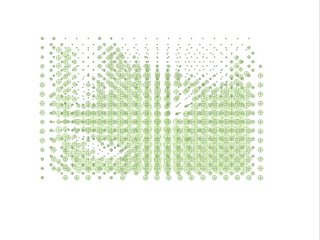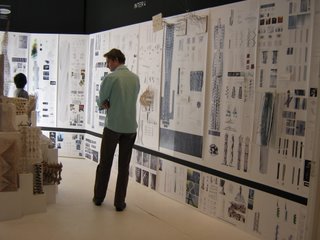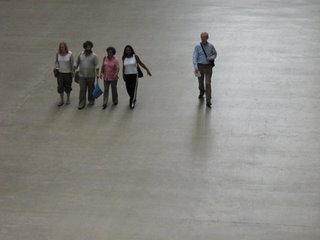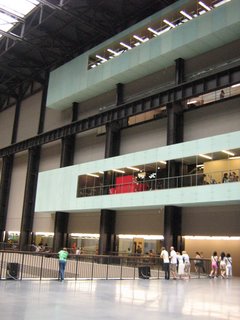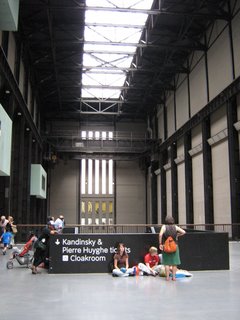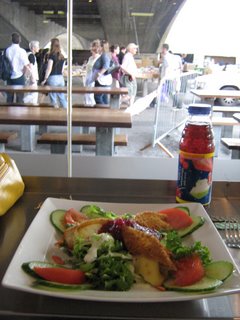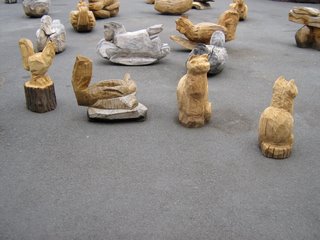Saturday, July 29, 2006
on porosity
Main Entry: po·ros·i·ty
Pronunciation: p&-'rä-s&-tE, po-
Function: noun
Inflected Form(s): plural -ties
1 a : the quality or state of being porous b : the ratio of the volume of interstices of a material to the volume of its mass
2 : PORE
Pronunciation: p&-'rä-s&-tE, po-
Function: noun
Inflected Form(s): plural -ties
1 a : the quality or state of being porous b : the ratio of the volume of interstices of a material to the volume of its mass
2 : PORE
on this day
yesturday>>>>
i went to a conference featuring writers, composers,artists,activiste and architects. i was priveleged enough to sit literally less than a meter away from two of the greates legends in architectura> zaha hadid and rem koolhaas... dios mio dios mio..... fue hermoso.
i went to a conference featuring writers, composers,artists,activiste and architects. i was priveleged enough to sit literally less than a meter away from two of the greates legends in architectura> zaha hadid and rem koolhaas... dios mio dios mio..... fue hermoso.
Wednesday, July 26, 2006
otra perspectiva
There is no democracy in the world
that should tolerate missiles being fired at its cities without taking
every reasonable step to stop the attacks. The big question raised by
Israel's military actions in Lebanon is what is "reasonable." The
answer, according to the laws of war, is that it is reasonable to
attack military targets, so long as every effort is made to reduce
civilian casualties. If the objectives cannot be achieved without some
civilian casualties, these must be "proportional" to the civilian
casualties that would be prevented by the military action.
This is all well and good for democratic nations that deliberately
locate their military bases away from civilian population centers.
Israel has its air force, nuclear facilities and large army bases in
locations as remote as anything can be in that country. It is possible
for an enemy to attack Israeli military targets without
inflicting "collateral damage" on its civilian population. Hezbollah
and Hamas, by contrast, deliberately operate military wings out of
densely populated areas. They launch antipersonnel missiles with ball-
bearing shrapnel, designed by Syria and Iran to maximize civilian
casualties, and then hide from retaliation by living among civilians.
If Israel decides not to go after them for fear of harming civilians,
the terrorists win by continuing to have free rein in attacking
civilians with rockets. If Israel does attack, and causes civilian
casualties, the terrorists win a propaganda victory: The international
community pounces on Israel for its "dispropo
rtionate" response. This chorus of condemnation actually encourages
the terrorists to operate from civilian areas.
While Israel does everything reasonable to minimize civilian
casualties — not always with success — Hezbollah and Hamas want to
maximize civilian casualties on both sides. Islamic terrorists, a
diplomat commented years ago, "have mastered the harsh arithmetic of
pain. . . . Palestinian casualties play in their favor and Israeli
casualties play in their favor." These are groups that send children
to die as suicide bombers, sometimes without the child knowing that he
is being sacrificed. Two years ago, an 11-year-old was paid to take a
parcel through Israeli security. Unbeknownst to him, it contained a
bomb that was to be detonated remotely. (Fortunately the plot was
foiled.)
This misuse of civilians as shields and swords requires a reassessment
of the laws of war. The distinction between combatants and civilians —
easy when combatants were uniformed members of armies that fought on
battlefields distant from civilian centers — is more difficult in the
present context. Now, there is a continuum of "civilianality": Near
the most civilian end of this continuum are the pure innocents —
babies, hostages and others completely uninvolved; at the more
combatant end are civilians who willingly harbor terrorists, provide
material resources and serve as human shields; in the middle are those
who support the terrorists politically, or spiritually.
The laws of war and the rules of morality must adapt to these
realities. An analogy to domestic criminal law is instructive: A bank
robber who takes a teller hostage and fires at police from behind his
human shield is guilty of murder if they, in an effort to stop the
robber from shooting, accidentally kill the hostage. The same should
be true of terrorists who use civilians as shields from behind whom
they fire their rockets. The terrorists must be held legally and
morally responsible for the deaths of the civilians, even if the
direct physical cause was an Israeli rocket aimed at those targeting
Israeli citizens.
Israel must be allowed to finish the fight that Hamas and Hezbollah
started, even if that means civilian casualties in Gaza and Lebanon. A
democracy is entitled to prefer the lives of its own innocents over
the lives of the civilians of an aggressor, especially if the latter
group contains many who are complicit in terrorism. Israel will — and
should — take every precaution to minimize civilian casualties on the
other side. On July 16, Hasan Nasrallah, the head of Hezbollah,
announced there will be new "surprises," and the Aska Martyrs Brigade
said that it had developed chemical and biological weapons that could
be added to its rockets. Should Israel not be allowed to pre-empt
their use?
Israel left Lebanon in 2000 and Gaza in 2005. These are not "occupied"
territories. Yet they serve as launching pads for attacks on Israeli
civilians. Occupation does not cause terrorism, then, but terrorism
seems to cause occupation. If Israel is not to reoccupy to prevent
terrorism, the Lebanese government and the Palestinian Authority must
ensure that these regions cease to be terrorist safe havens.
that should tolerate missiles being fired at its cities without taking
every reasonable step to stop the attacks. The big question raised by
Israel's military actions in Lebanon is what is "reasonable." The
answer, according to the laws of war, is that it is reasonable to
attack military targets, so long as every effort is made to reduce
civilian casualties. If the objectives cannot be achieved without some
civilian casualties, these must be "proportional" to the civilian
casualties that would be prevented by the military action.
This is all well and good for democratic nations that deliberately
locate their military bases away from civilian population centers.
Israel has its air force, nuclear facilities and large army bases in
locations as remote as anything can be in that country. It is possible
for an enemy to attack Israeli military targets without
inflicting "collateral damage" on its civilian population. Hezbollah
and Hamas, by contrast, deliberately operate military wings out of
densely populated areas. They launch antipersonnel missiles with ball-
bearing shrapnel, designed by Syria and Iran to maximize civilian
casualties, and then hide from retaliation by living among civilians.
If Israel decides not to go after them for fear of harming civilians,
the terrorists win by continuing to have free rein in attacking
civilians with rockets. If Israel does attack, and causes civilian
casualties, the terrorists win a propaganda victory: The international
community pounces on Israel for its "dispropo
rtionate" response. This chorus of condemnation actually encourages
the terrorists to operate from civilian areas.
While Israel does everything reasonable to minimize civilian
casualties — not always with success — Hezbollah and Hamas want to
maximize civilian casualties on both sides. Islamic terrorists, a
diplomat commented years ago, "have mastered the harsh arithmetic of
pain. . . . Palestinian casualties play in their favor and Israeli
casualties play in their favor." These are groups that send children
to die as suicide bombers, sometimes without the child knowing that he
is being sacrificed. Two years ago, an 11-year-old was paid to take a
parcel through Israeli security. Unbeknownst to him, it contained a
bomb that was to be detonated remotely. (Fortunately the plot was
foiled.)
This misuse of civilians as shields and swords requires a reassessment
of the laws of war. The distinction between combatants and civilians —
easy when combatants were uniformed members of armies that fought on
battlefields distant from civilian centers — is more difficult in the
present context. Now, there is a continuum of "civilianality": Near
the most civilian end of this continuum are the pure innocents —
babies, hostages and others completely uninvolved; at the more
combatant end are civilians who willingly harbor terrorists, provide
material resources and serve as human shields; in the middle are those
who support the terrorists politically, or spiritually.
The laws of war and the rules of morality must adapt to these
realities. An analogy to domestic criminal law is instructive: A bank
robber who takes a teller hostage and fires at police from behind his
human shield is guilty of murder if they, in an effort to stop the
robber from shooting, accidentally kill the hostage. The same should
be true of terrorists who use civilians as shields from behind whom
they fire their rockets. The terrorists must be held legally and
morally responsible for the deaths of the civilians, even if the
direct physical cause was an Israeli rocket aimed at those targeting
Israeli citizens.
Israel must be allowed to finish the fight that Hamas and Hezbollah
started, even if that means civilian casualties in Gaza and Lebanon. A
democracy is entitled to prefer the lives of its own innocents over
the lives of the civilians of an aggressor, especially if the latter
group contains many who are complicit in terrorism. Israel will — and
should — take every precaution to minimize civilian casualties on the
other side. On July 16, Hasan Nasrallah, the head of Hezbollah,
announced there will be new "surprises," and the Aska Martyrs Brigade
said that it had developed chemical and biological weapons that could
be added to its rockets. Should Israel not be allowed to pre-empt
their use?
Israel left Lebanon in 2000 and Gaza in 2005. These are not "occupied"
territories. Yet they serve as launching pads for attacks on Israeli
civilians. Occupation does not cause terrorism, then, but terrorism
seems to cause occupation. If Israel is not to reoccupy to prevent
terrorism, the Lebanese government and the Palestinian Authority must
ensure that these regions cease to be terrorist safe havens.
Thursday, July 20, 2006
tortilla wrap
in my nostalgia, figured out a way to do something with tortillinas that i brought>
recipe for smiles>
one tortilla
chicken strips dipped in honey
fresh lettuce
cucumbers thinly sliced
curry powder
salt
a lot of ajonjoli.
instructions>
fry.dip.cover.wrap.eat.smile
recipe for smiles>
one tortilla
chicken strips dipped in honey
fresh lettuce
cucumbers thinly sliced
curry powder
salt
a lot of ajonjoli.
instructions>
fry.dip.cover.wrap.eat.smile
that one series on the top of the mole
Fibonacci sequence>
13th century, leonardo da pisa, is an aproximation to the golden section in terms of whole numbers. each number in the secuence is the sum of the two preceeding ones> 0,1,1,2,3,5,8,13,21,34 etc. this is the basis of phyllotaxis, the ascending spiral arrangements of foliar and floral organs, a subject which has fascinated designers investigating the natural world.
why is this so faking cool? check out a sunflower for example the number of seeds produced by it will match the fibonacci series, as the number of petals and even the angle in which they grow from each other, nature in incredibly undenyably mathematical, super chido guey.
"an ounce of prevention is worth a pound of cure."
-anonymous.
13th century, leonardo da pisa, is an aproximation to the golden section in terms of whole numbers. each number in the secuence is the sum of the two preceeding ones> 0,1,1,2,3,5,8,13,21,34 etc. this is the basis of phyllotaxis, the ascending spiral arrangements of foliar and floral organs, a subject which has fascinated designers investigating the natural world.
why is this so faking cool? check out a sunflower for example the number of seeds produced by it will match the fibonacci series, as the number of petals and even the angle in which they grow from each other, nature in incredibly undenyably mathematical, super chido guey.
"an ounce of prevention is worth a pound of cure."
-anonymous.
tropical london
tropical london> this is the name of the title of the portion of summer course at the AA in which i am participationg and which i am living right now. we have had temp of 32 to 40 degrees and we melting away in the tube. i leave now an orange based internet cafe to be sucked into a horrible crowd filled tube station , sweaty smelly and semi hairy arm pits everywhere. everybody's pores arte quite visible here nd hair is plastered to the foreheads of many.
on the other hand tropical london with respect to my project speaks of a direct relationship between the themes river, specificmapped microclamtes in a new software called rhino, heat aborbtion in materials, tile properties in surrounding surfaces, porosity and water retention of materials etc. its been tough and tedious but im working at it and liking it !
on the other hand tropical london with respect to my project speaks of a direct relationship between the themes river, specificmapped microclamtes in a new software called rhino, heat aborbtion in materials, tile properties in surrounding surfaces, porosity and water retention of materials etc. its been tough and tedious but im working at it and liking it !
I don't even know where our neighbourhood was," said one Lebanese Shi'ite, looking for where his home had been on the edge of a bomb-blasted Hizbollah compound in southern Beirut.
"They're still bombarding the area to grind it to dust. What kind of crime is this?" said the man, giving his name as Hassan.
Israelis, stunned by Hizbollah rocket attacks, said they wanted their army to smash the guerrilla group and most favoured killing its leader, Sayyed Hassan Nasrallah, a poll showed.
"We are killing those we need to kill," said Hanna Dehan, 60, speaking near the Israeli city of Haifa, where eight people were killed on Sunday when a Hizbollah rocket hit a train station.
SYRIAN CONNECTION?
"They're still bombarding the area to grind it to dust. What kind of crime is this?" said the man, giving his name as Hassan.
Israelis, stunned by Hizbollah rocket attacks, said they wanted their army to smash the guerrilla group and most favoured killing its leader, Sayyed Hassan Nasrallah, a poll showed.
"We are killing those we need to kill," said Hanna Dehan, 60, speaking near the Israeli city of Haifa, where eight people were killed on Sunday when a Hizbollah rocket hit a train station.
SYRIAN CONNECTION?
enterate
by naihma white:
Israel and Lebanon: The World Watches While the U.S. Waits a Week
Over the last week conflict and tensions are escalating across the globe, especially in the Middle East. The fighting between Israel and Lebanon is especially troubling, threatening to erupt into more widespread violence and spread to neighboring countries.
International calls for a cease-fire have been issued, but without the voice of the United States. Instead the US is trying to get diplomatic support for a cease-fire of "lasting value" according to Condoleezza Rice.
Syria’s president, Bashar al-Assad criticized the international community for "procrastinating" on ending the conflict. This statement appears to be a direct challenge to President Bush, as the President stated that Israel can continue attacks for another week or so, before intervening with diplomatic action.
The unequal use of force between Israel and Lebanon is evident. According to the NY Times, some 230 Lebanese are dead, most of them civilians, compared to 25 Israeli dead, 13 of them civilians. This imbalance has led some countries like France and the European Union to accuse Israel of disproportionate use of force. What are Israel’s strategies, goals and ambitions? Is there a way to resolve this crisis?
The Mainstream Media Project Offers the Following guests for Interviews:
On Lebanon/Hizbollah:Dr. Stephen Zunes (CA), Professor of politics and Chair of the Peace & Justice Studies Program, University of San Francisco, founding director of the Institute for a New Middle East Policy, Middle East editor of the Foreign Policy in Focus Project, IPS; author, Tinderbox: U.S. Middle East Policy and the Roots of Terrorism; culture and politics of the Middle East and the impact of the U.S. invasion and occupation of Iraq on the Middle East and on U.S. Middle East policy
Ussama Makdisi (TX), Associate professor of history, Rice University. Author of "The Culture of Sectarianism: Community, History and Violence in Nineteenth-Century Ottoman Lebanon" (2000), "Anti-Americanism in the Arab World: An Interpretation of a Brief History" in the Journal of American History, and an editor with Paul Silverstein of "Memory and Violence in the Middle East and North Africa" (2006).
Hussein Ibish (DC), Executive Director of the Hala Salaam Maksoud Foundation for Arab-American Leadership; also Senior Fellow at the American Task Force on Palestine (ATFP); perceptions of the Iraq elections in the Arab world; democracy-building in Arab countries; American Iraqis voting in the election; impact of U.S. policies toward Iraq on Arab and Muslim views of U.S.; how the trial of Saddam Hussein is perceived in the Arab and Muslim world; Lebanon and Hezbollah
Jews for Peace:Rabbi Arthur Waskow, Ph.D. (PA), Director of The Shalom Center. Author of The Freedom Seder, Seasons of Our Joy, Down-to-Earth Judaism, Godwrestling, and Godwrestling -- Round 2. In 1996 at the Habitat II conference, the United Nations named him one of forty Wisdom-Keepers from around the world. In 2001 he was presented the Abraham Joshua Heschel Award. Rabbi Waskow frequently leads Shabbat and weekday explorations for synagogues, campuses, retreat centers, and inter-religious gatherings.Rabbi Michael Lerner (CA), Editor of TIKKUN Magazine, which he founded in 1986. Studied at the Jewish Theological Seminary in NYC and was mentored by Abraham Joshua Heschel. He received a Ph.D. in philosophy at the University of California, Berkeley in 1972 and a Ph.D. in clinical psychology at the Wright Institute in 1977. In 1979 he became principal investigator for an NIMH study described above. Rabbi Lerner is the author of "Jewish Renewal: A Path to Healing and Transformation".
On Lebanon under attack, Internally displaced people in Beirut Bassam Haddad (Syria), Assistant Professor of Political Science, St. Joseph's University; author of "The Formation and Development of Economic Networks in Syria: Implications for Economic and Fiscal Reforms, 1986-2000", published in Networks of Privilege: The Politics of Economic Reform in the Middle East (2004). Currently working on his first book on Syria's political economy. Haddad is co-producer and director of the award-winning documentary film, "About Baghdad", (www.aboutbaghdad.com) and the director and executive producer of the documentary series "Arabs and Terrorism" (http://www.arabsandterrorism.com/project.cfm).
NOTE: The Following 4 guests are in Lebanon. Due to disruption to phone systems, it may take more than one call to connect to them
Ghassan Makarem, One of the main organizers of the grassroots coalition, Sanayeh Relief Center (http://sanayehreliefcenter.blogspot.com/), which provides relief to displaced Lebanese. He works on Al Yasari, a multi-tendency leftist magazine, as well as with Beirut Indymedia.
Ahmad Farhat, Representative of ATTAC Lubnan, which is part of the coalition Sanayeh Relief Center (www.sanayehreliefcenter.blogspot.com), organizing relief for the displaced Lebanese now in Beirut.
Muna Kanafani, Serves on the municipal council in Sidon. She is helping to organize relief work in the city. Ghanem Bibi, Director of the Arab Resource Collective, a non-profit development organization that works to better childhood, health, education, communication and community development. The Arab Resource Collective’s mission is to build on the capacities of each person and on people’s experience in order to develop knowledge and translate rights into reality. The collective adopts a holistic and integrated approach to development, and practices collective work through consultation, networking and partnerships.
Israel at War: Analysis of Goals
Joe Volk (DC) Executive Secretary, Friends Committee on National Legislation; conflict between Israel and Lebanon; Syria; consequences of the warring between Israel and its neighbors; how to bring peace and mutual security to the region; intensive and sustained diplomatic initiatives
Ilan Pappe (Haifa) Senior Lecturer Department of Political Science, Haifa University; Chair of the Emil Touma Institute for Palestinian Studies in Haifa; Academic Director of the Research Institute for Peace at Givat Haviva. Author of many books relating to the Israeli-Palestinian conflict, who, with the publication of each, has been both acclaimed and smeared. Ilan Pappe’s most recent books are The Modern Middle East (Routledge, 2005), and A History of Modern Palestine: One Land, Two Peoples (Cambridge University Press, 2004), in which he documents the expulsion of Palestinians as an orchestrated crime of ethnic cleansing that tore apart Jews and Arabs coexisting peacefully. His newest work is entitled "Ethnic Cleansing of Palestine," and is scheduled for publication this fall.Robert Dreyfuss (VA) Journalist and author. He has written for Rolling Stone, Columbia Journalism Review and Washington Monthly, among others. He currently covers national security for Rolling Stone’s National Affairs section and is a contributing editor for The Nation and a contributing writer for Mother Jones. His articles have also appeared in The New Republic, Newsday, Worth, California Lawyer, The Texas Observer, E, In These Times, The Detroit Metro Times, Public Citizen, Extra!, and, in Japan, in Esquire, Foresight and Nikkei Business. Online, he writes for TomPaine.com produces a popular blog for Tom Paine called The Dreyfuss Report. Robert Dreyfuss is the author of the recent book "Devil's Game: How the United States Helped Unleash Fundamentalist Islam."
Trita Parsi (DC) Specialist in Israeli-Iranian relations, wrote the article "Israel Readies for Iran Showdown by Attacking Lebanon". Parsi's articles on Middle East affairs have been published in the Financial Times, Jane's Intelligence Review, the Globalist, the Jerusalem Post, The Forward, BitterLemons and the Daily Star. He is a frequent commentator on US-Iranian relations and Middle Eastern affairs, and has appeared on BBC World News, PBS NewsHour with Jim Lehrer, Al Jazeera, C-Span, NPR, MSNBC, Voice of America and British Channel 4. Author of "Treacherous Triangle -- The Secret Dealings of Iran, Israel and the United States," scheduled for publication next year.
Israel and Lebanon: The World Watches While the U.S. Waits a Week
Over the last week conflict and tensions are escalating across the globe, especially in the Middle East. The fighting between Israel and Lebanon is especially troubling, threatening to erupt into more widespread violence and spread to neighboring countries.
International calls for a cease-fire have been issued, but without the voice of the United States. Instead the US is trying to get diplomatic support for a cease-fire of "lasting value" according to Condoleezza Rice.
Syria’s president, Bashar al-Assad criticized the international community for "procrastinating" on ending the conflict. This statement appears to be a direct challenge to President Bush, as the President stated that Israel can continue attacks for another week or so, before intervening with diplomatic action.
The unequal use of force between Israel and Lebanon is evident. According to the NY Times, some 230 Lebanese are dead, most of them civilians, compared to 25 Israeli dead, 13 of them civilians. This imbalance has led some countries like France and the European Union to accuse Israel of disproportionate use of force. What are Israel’s strategies, goals and ambitions? Is there a way to resolve this crisis?
The Mainstream Media Project Offers the Following guests for Interviews:
On Lebanon/Hizbollah:Dr. Stephen Zunes (CA), Professor of politics and Chair of the Peace & Justice Studies Program, University of San Francisco, founding director of the Institute for a New Middle East Policy, Middle East editor of the Foreign Policy in Focus Project, IPS; author, Tinderbox: U.S. Middle East Policy and the Roots of Terrorism; culture and politics of the Middle East and the impact of the U.S. invasion and occupation of Iraq on the Middle East and on U.S. Middle East policy
Ussama Makdisi (TX), Associate professor of history, Rice University. Author of "The Culture of Sectarianism: Community, History and Violence in Nineteenth-Century Ottoman Lebanon" (2000), "Anti-Americanism in the Arab World: An Interpretation of a Brief History" in the Journal of American History, and an editor with Paul Silverstein of "Memory and Violence in the Middle East and North Africa" (2006).
Hussein Ibish (DC), Executive Director of the Hala Salaam Maksoud Foundation for Arab-American Leadership; also Senior Fellow at the American Task Force on Palestine (ATFP); perceptions of the Iraq elections in the Arab world; democracy-building in Arab countries; American Iraqis voting in the election; impact of U.S. policies toward Iraq on Arab and Muslim views of U.S.; how the trial of Saddam Hussein is perceived in the Arab and Muslim world; Lebanon and Hezbollah
Jews for Peace:Rabbi Arthur Waskow, Ph.D. (PA), Director of The Shalom Center. Author of The Freedom Seder, Seasons of Our Joy, Down-to-Earth Judaism, Godwrestling, and Godwrestling -- Round 2. In 1996 at the Habitat II conference, the United Nations named him one of forty Wisdom-Keepers from around the world. In 2001 he was presented the Abraham Joshua Heschel Award. Rabbi Waskow frequently leads Shabbat and weekday explorations for synagogues, campuses, retreat centers, and inter-religious gatherings.Rabbi Michael Lerner (CA), Editor of TIKKUN Magazine, which he founded in 1986. Studied at the Jewish Theological Seminary in NYC and was mentored by Abraham Joshua Heschel. He received a Ph.D. in philosophy at the University of California, Berkeley in 1972 and a Ph.D. in clinical psychology at the Wright Institute in 1977. In 1979 he became principal investigator for an NIMH study described above. Rabbi Lerner is the author of "Jewish Renewal: A Path to Healing and Transformation".
On Lebanon under attack, Internally displaced people in Beirut Bassam Haddad (Syria), Assistant Professor of Political Science, St. Joseph's University; author of "The Formation and Development of Economic Networks in Syria: Implications for Economic and Fiscal Reforms, 1986-2000", published in Networks of Privilege: The Politics of Economic Reform in the Middle East (2004). Currently working on his first book on Syria's political economy. Haddad is co-producer and director of the award-winning documentary film, "About Baghdad", (www.aboutbaghdad.com) and the director and executive producer of the documentary series "Arabs and Terrorism" (http://www.arabsandterrorism.com/project.cfm).
NOTE: The Following 4 guests are in Lebanon. Due to disruption to phone systems, it may take more than one call to connect to them
Ghassan Makarem, One of the main organizers of the grassroots coalition, Sanayeh Relief Center (http://sanayehreliefcenter.blogspot.com/), which provides relief to displaced Lebanese. He works on Al Yasari, a multi-tendency leftist magazine, as well as with Beirut Indymedia.
Ahmad Farhat, Representative of ATTAC Lubnan, which is part of the coalition Sanayeh Relief Center (www.sanayehreliefcenter.blogspot.com), organizing relief for the displaced Lebanese now in Beirut.
Muna Kanafani, Serves on the municipal council in Sidon. She is helping to organize relief work in the city. Ghanem Bibi, Director of the Arab Resource Collective, a non-profit development organization that works to better childhood, health, education, communication and community development. The Arab Resource Collective’s mission is to build on the capacities of each person and on people’s experience in order to develop knowledge and translate rights into reality. The collective adopts a holistic and integrated approach to development, and practices collective work through consultation, networking and partnerships.
Israel at War: Analysis of Goals
Joe Volk (DC) Executive Secretary, Friends Committee on National Legislation; conflict between Israel and Lebanon; Syria; consequences of the warring between Israel and its neighbors; how to bring peace and mutual security to the region; intensive and sustained diplomatic initiatives
Ilan Pappe (Haifa) Senior Lecturer Department of Political Science, Haifa University; Chair of the Emil Touma Institute for Palestinian Studies in Haifa; Academic Director of the Research Institute for Peace at Givat Haviva. Author of many books relating to the Israeli-Palestinian conflict, who, with the publication of each, has been both acclaimed and smeared. Ilan Pappe’s most recent books are The Modern Middle East (Routledge, 2005), and A History of Modern Palestine: One Land, Two Peoples (Cambridge University Press, 2004), in which he documents the expulsion of Palestinians as an orchestrated crime of ethnic cleansing that tore apart Jews and Arabs coexisting peacefully. His newest work is entitled "Ethnic Cleansing of Palestine," and is scheduled for publication this fall.Robert Dreyfuss (VA) Journalist and author. He has written for Rolling Stone, Columbia Journalism Review and Washington Monthly, among others. He currently covers national security for Rolling Stone’s National Affairs section and is a contributing editor for The Nation and a contributing writer for Mother Jones. His articles have also appeared in The New Republic, Newsday, Worth, California Lawyer, The Texas Observer, E, In These Times, The Detroit Metro Times, Public Citizen, Extra!, and, in Japan, in Esquire, Foresight and Nikkei Business. Online, he writes for TomPaine.com produces a popular blog for Tom Paine called The Dreyfuss Report. Robert Dreyfuss is the author of the recent book "Devil's Game: How the United States Helped Unleash Fundamentalist Islam."
Trita Parsi (DC) Specialist in Israeli-Iranian relations, wrote the article "Israel Readies for Iran Showdown by Attacking Lebanon". Parsi's articles on Middle East affairs have been published in the Financial Times, Jane's Intelligence Review, the Globalist, the Jerusalem Post, The Forward, BitterLemons and the Daily Star. He is a frequent commentator on US-Iranian relations and Middle Eastern affairs, and has appeared on BBC World News, PBS NewsHour with Jim Lehrer, Al Jazeera, C-Span, NPR, MSNBC, Voice of America and British Channel 4. Author of "Treacherous Triangle -- The Secret Dealings of Iran, Israel and the United States," scheduled for publication next year.
Tuesday, July 18, 2006
ahora si mi primer supermarket
mi primera lista de compras en el super>1. pan2.ajo3. aceite de olivo.4. humus5. jugo de narnaja6 jugo de arandano7. pavo8 queso mozzarella9 queso cheddar10 yoghurt de fresa11. pollo esilo teriyaki12. curry13 pasta para salsa italiana14 pasta15 leche16 agua17 mayonesa18 jitomates19 lechugammmmmm esoty instalada!!
Monday, July 17, 2006
compras
mi primera lista de compras en el super>
1. pan
2.ajo
3. aceite de olivo.
4. humus
5. jugo de narnaja
6 jugo de arandano
7. pavo
8 queso mozzarella
9 queso cheddar
10 yoghurt de fresa
11. pollo esilo teriyaki
12. curry
13 pasta para salsa italiana
14 pasta
15 leche
16 agua
17 mayonesa
18 jitomates
19 lechuga
mmmmmm esoty instalada!!
1. pan
2.ajo
3. aceite de olivo.
4. humus
5. jugo de narnaja
6 jugo de arandano
7. pavo
8 queso mozzarella
9 queso cheddar
10 yoghurt de fresa
11. pollo esilo teriyaki
12. curry
13 pasta para salsa italiana
14 pasta
15 leche
16 agua
17 mayonesa
18 jitomates
19 lechuga
mmmmmm esoty instalada!!
Saturday, July 15, 2006
Wednesday, July 12, 2006
random thoughts on bar scenarios
excuse me where is the toilet?
excuse me could you lend me hand to get to waterloo?
one crandwberry vodka please .. oh thats 4 pounds oh ok ill have a beer then...
excuse me could you lend me hand to get to waterloo?
one crandwberry vodka please .. oh thats 4 pounds oh ok ill have a beer then...
london bridges
its been confusing juggling these three languages french spanish and english and finally my mind is on the english zone. im back in london this incredible city which i am devouring. im actually in a small internet cafe strictly on email and blog time and i wont be able to stay much since i have a city precisely to go and enjoy but i hadnt writtena lmost anything and i wanted to document so much. ( by the way this should be read with a strict posh spice girl accent in mind) so yeah. here we go. nou sommmes ici.
breakfast>
banana bread
fruit tea
lunch options in my headIM HUNGRY> sandwich and tomatoe wrap... mmmmm
dinnner? dunno. maybe pasta
im actually enjoying hte food much more than everybody has told me yesturday i passed along alovely marketplace filled with indian food no mames que rico.
y pase por un puestode comida mexicana y estaba la rola de gasolina no puede ser no puede ser jajajj
breakfast>
banana bread
fruit tea
lunch options in my headIM HUNGRY> sandwich and tomatoe wrap... mmmmm
dinnner? dunno. maybe pasta
im actually enjoying hte food much more than everybody has told me yesturday i passed along alovely marketplace filled with indian food no mames que rico.
y pase por un puestode comida mexicana y estaba la rola de gasolina no puede ser no puede ser jajajj
Sunday, July 09, 2006
las dos ciudades
salut je suis en marseillemes poulettes j espere le match de ce soir avec mon amie leti.
ya salte el charco esoty bien un poco desubicada pero bien extrano poder entender todo lo aue me dicen jajaj entiendo a veces todo a veces nada y a veces la mitad pero estoy aprendiendo bastante de frances he comido super rico quesos magnificos ye stoy descubriendo londres y marseille !!!!!!
je suis content je suis tres content
ya salte el charco esoty bien un poco desubicada pero bien extrano poder entender todo lo aue me dicen jajaj entiendo a veces todo a veces nada y a veces la mitad pero estoy aprendiendo bastante de frances he comido super rico quesos magnificos ye stoy descubriendo londres y marseille !!!!!!
je suis content je suis tres content
Wednesday, July 05, 2006
alex numero dieci
GRANDI AZZURRI GRANDE ALESSANDO DEL PIERO OLEEEEE
ALESSANDO DEL PIERO OLÊ ALESSANDO DEL PIERO OLE!!!!!!
ho visto la partita oggi colla mia famiglia, ( senza andres lui invea bece si trovava a roma che bastardo figuratevi guardando la partita a roma! dai!)
allora, ho visto la partita con i miei, charo e gian franco morabito, l ùnico italiano propio col pasaporte, il resto eravamo messicani wannabes.... eh!
va be ci siamo nella finale,
io la guaderò da marseile avec une amie, sarà difcile sapere per chi tifo ? é ovvio mio cuore é sempre azurro peró!
bacione bastardi puzzanti di merda col cazo magrisisiisismo
ALESSANDO DEL PIERO OLÊ ALESSANDO DEL PIERO OLE!!!!!!
ho visto la partita oggi colla mia famiglia, ( senza andres lui invea bece si trovava a roma che bastardo figuratevi guardando la partita a roma! dai!)
allora, ho visto la partita con i miei, charo e gian franco morabito, l ùnico italiano propio col pasaporte, il resto eravamo messicani wannabes.... eh!
va be ci siamo nella finale,
io la guaderò da marseile avec une amie, sarà difcile sapere per chi tifo ? é ovvio mio cuore é sempre azurro peró!
bacione bastardi puzzanti di merda col cazo magrisisiisismo
Tuesday, July 04, 2006
lukas wedding

lukas winner, a signore with a twist in his name that makes him special wed the lovely petra in the beautiful beautifl scenario. their family members made a heart with them inside and they all let go hundreds of olorful balloons from their home town zelem zee in austria congratulations auguri vi volgio tanto bene
estense pendientes del camaron
ayer en un remoto cafe se creó la rola: caramelo
que habla del amor de un camarero camarón. el hit llegara a las listas mundiales de exitos con partiicpantes:
may zindel paola de la concha melina gomez moni del valle y paulo mendez. esten pendientes.
estamso en busqueda de un nombre para nuestro grupo que sacará tan solo esta cancion sugerencias?
hay:
chicas caramelo
camaron nacional
caramelo nacional??
any other suggestions. el chiste es que nuestro grupo sea cgaado sumamente vulgar y regguetonesco para unirnos a las masas y crear un capital considerable para poder invertir en proyectos mas coherentes.
que habla del amor de un camarero camarón. el hit llegara a las listas mundiales de exitos con partiicpantes:
may zindel paola de la concha melina gomez moni del valle y paulo mendez. esten pendientes.
estamso en busqueda de un nombre para nuestro grupo que sacará tan solo esta cancion sugerencias?
hay:
chicas caramelo
camaron nacional
caramelo nacional??
any other suggestions. el chiste es que nuestro grupo sea cgaado sumamente vulgar y regguetonesco para unirnos a las masas y crear un capital considerable para poder invertir en proyectos mas coherentes.
aplaudos a madrazo
México, 3 Jul (Notimex).- Acompañado por gobernadores y la dirigencia nacional del PRI, el candidato presidencial de la Alianza por México, Roberto Madrazo Pintado, reconoció su derrota electoral y avaló la legitimidad y transparencia de la elección de este domingo. A casi 24 horas de haber concluido la jornada electoral, el político tabasqueño aseguró que el PRI no es una fuerza política que regatea en tribunales lo que no gana en las urnas y advirtió que en la democracia se gana o se pierde por un voto. Sin poder ocultar su tristeza, el político tabasqueño ratificó que el Partido Revolucionario Institucional (PRI) le apuesta al voto, no a la descalificación: "somos un partido maduro que no moviliza a la gente a la calle, un partido que no pondrá en juego la estabilidad del país".
Subscribe to:
Comments (Atom)


